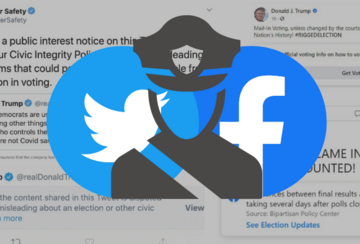Riana Pfefferkorn of SIO spoke with Wired on Meta's expansion of end-to-end encryption in Messenger.

SPICE has developed free lesson plans on an important chapter of U.S. immigration history that is largely unknown.

China’s Huge Exercises Around Taiwan Were a Rehearsal, Not a Signal, Says Oriana Skylar Mastro
Nancy Pelosi’s visit was more pretext than provocation.

The standoff between China and Taiwan (and the U.S.) has heightened tensions to their highest level in decades but — so far at least — economic observers haven’t seen a worst-case scenario.
Congratulations to student honorees Kasane Horiuchi and Mihiro Tomomatsu.

The Program on Arab Reform and Democracy (ARD) at CDDRL is pleased to announce the release of the July 2022 issue of Mofeed Digest, a periodic recap of the most important scholarly and policy publications, reports, and articles investigating the impact of the COVID-19 pandemic on the politics, economies, and societies of the Arab world.

In an essay for Lawfare Blog, Samantha Bradshaw of American University and Shelby Grossman of the Stanford Internet Observatory explore whether two key platforms, Facebook and Twitter, were internally consistent in how they applied their labels during the 2020 presidential election.
Mind Farce
An Investigation into an Inauthentic Facebook and Instagram Network Linked to an Israeli Public Relations Firm
Scott Rozelle is interviewed for the "What China Wants by Sam Olson" podcast, where he discusses "The Dangers from Invisible Chine," how the massive rural population threatens the country's future.

Marciel, a former senior U.S. diplomat, brings extensive experience in public policy focused on Southeast Asia. His appointment is based at FSI’s Walter H. Shorenstein Asia-Pacific Research Center.
Three Stanford scholars have been elected to the British Academy, in recognition of their achievements in the humanities and social sciences.

The Korean Wave, which has unique characteristics and continues to evolve in intriguing directions, could become a first mover on the global cultural scene.

Ending the fighting may well require talks, but the decision to negotiate should lie with Kyiv.

Latin American countries will push again for nuclear disarmament at this month’s review conference

During a hearing titled “A Growing Threat: Foreign And Domestic Sources Of Disinformation," DiResta offered expert testimony on influence operations and the spread of narratives across social and media networks.

Herb Lin, a disinformation scholar at Stanford, said DHS will need to tread carefully moving forward. He worries “about any government involvement in this business” and whether “any mechanism that you set up can be made tamper proof.”

Dr. Daniel Greene has been accepted as a 2022 Emerging Leaders in Biosecurity fellow from the Center for Health Security at John Hopkins University.

Expanding upon classic deterrence strategies, Center Fellow Oriana Skylar Mastro proposes an underutilized path to deterrence in which Guam — a remote U.S. outpost that has become a strategic hub as tensions with China rise — would remain a crucial logistical waypoint, even in the face of potential Chinese missile attack.
A look at how user choice and transparency provide new ways of addressing content moderation and online safety policy.
The following reflection is a guest post written by Nathan Chan, an alumnus and honoree of the 2021 Stanford e-China Program, which is accepting student applications until September 1, 2022.

One. More. Time. It’s not about NATO
One. More. Time. It’s not about NATO
Vladimir Putin and the Kremlin had a number of reasons for invading Ukraine in February and starting the largest military conflict in Europe since World War II. Putin sought to portray the pre-invasion crisis that Moscow created with Ukraine as a NATO-Russia dispute, but that framing does not stand up to serious scrutiny.

Center Fellow Oriana Skylar Mastro talks to the Center For Advanced China Research about the risk of Chinese attacks on U.S. military bases in Asia at the outset of a Taiwan conflict, the likelihood of Japanese or NATO involvement in a war over Taiwan, the downsides of focusing on communicating resolve to defend Taiwan, whether the United States is “outgunned” by China, and more.

Three things to know about the not-so-covert cyber-operations between these two adversaries
The U.S. Department of Veterans Affairs awards Keith Humphreys top honors for his research on treatments for substance use and psychiatric disorders.
New work by team including FSE researchers provides a broad, cautionary understanding of why financial incentives alone are unlikely to prevent forest-clearing fires in Indonesia’s oil palm regions.













